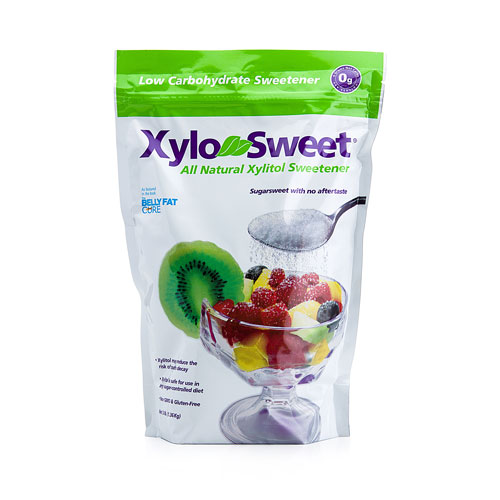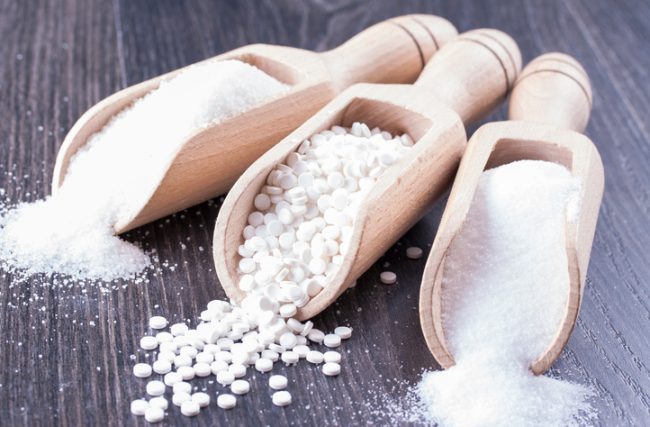If you have an incurable sweet tooth but hate the extra calories that come with sugary treats, sugar alcohols are probably part of your diet.
A sugar alcohol is a type of low-calorie sweetener found in everything from candies and gum to ice cream, cookies and soda.
Foods sweetened with sugar alcohols typically carry a label such as "sugar-free," "diet" or "no-added sugar" on the label. So, you likely consume sugar alcohols if you buy such products.
"They have a sweet taste and help keep foods moist, and add volume to the product," says Samantha Heller, a registered dietitian and senior clinical nutritionist at the NYU Langone Medical Center.
Despite the name, sugar alcohols do not contain alcohol. "They are considered polyols, and are found naturally in small amounts in some foods such as fruits and berries," Heller says. "They are also commercially produced."
There are many types of popular sugar alcohols, including sorbitol, erythritol, mannitol and xylitol.
What is sorbitol?
Sorbitol can be found in some fruits, but the commercially used form comes from glucose in cornstarch. The Sugar Association says it is 60 percent as sweet as table sugar and is used in:
- Baked goods and baking mixes
- Chewing gum
- Cough drops
- Flavored jam and jelly
- Hard and soft candies
What is erythritol?
Erythritol is the newest cornstarch-based sugar alcohol. It is 70 percent as sweet as table sugar, and is used in:
- Chewing gum
- Confectionery and baked products
- Some beverages
What is mannitol?
Mannitol is found in many plant fruits and leaves. Fruits and vegetables rich in mannitol include celery, mushrooms, onions, pumpkins and strawberries.
However, commercial use of mannitol stems from fructose in cornstarch. Mannitol is about 60 percent sweet as table sugar and is chiefly used in pharmaceutical products.
It also can be found in:
- Chewing gum
- Confections and frostings
- Cough drops
- Flavored jam and jelly
- Hard and soft candies
What is xylitol?
Xylitol is a sugar alcohol that tastes about as sweet as table sugar. It is chiefly used in:
- Candies
- Chewable vitamins
- Chewing gum
Are sugar alcohols safe?
Although experts have deemed sugar alcohols to be safe for consumption, they might cause side effects in some people who use them.
"Sugar alcohols are not completely absorbed in the small intestine," Heller says. "They can cause abdominal gas, bloating and diarrhea in some individuals."
For this reason, the Food and Drug Administration has mandated that foods that contain the sugar alcohols sorbitol or mannitol must include a warning on their label that states “excess consumption may have a laxative effect."
Evidence has emerged of other negative effects, Heller says.
"Research is suggesting that non-nutritive sweeteners may affect the body's ability to metabolize carbohydrates, increase cravings for sweet foods and beverages," she says.
Effects of sugar alcohols
In addition to sweetening foods and other products, sugar alcohols are known to produce a cooling sensation in the mouth when they are consumed in large concentrations.
Sugar alcohols vs. sugar
Sugar alcohols can offer some key health benefits over using table sugar.
"As a sugar substitute, they provide fewer calories – about a half to one-third less calories – than regular sugar," Heller says.
In addition, sugar alcohols have less of an impact on blood sugar levels than other carbohydrates, according to the American Diabetes Association.
Because of their side effects, Heller believes many people should steer clear of non-nutritive sweeteners. But there are times when they make sense, she says.
"If a patient is a brittle diabetic – meaning their blood sugars are erratic and hard to control – I may suggest using non-nutritive sweeteners that include sugar alcohols," she says.




